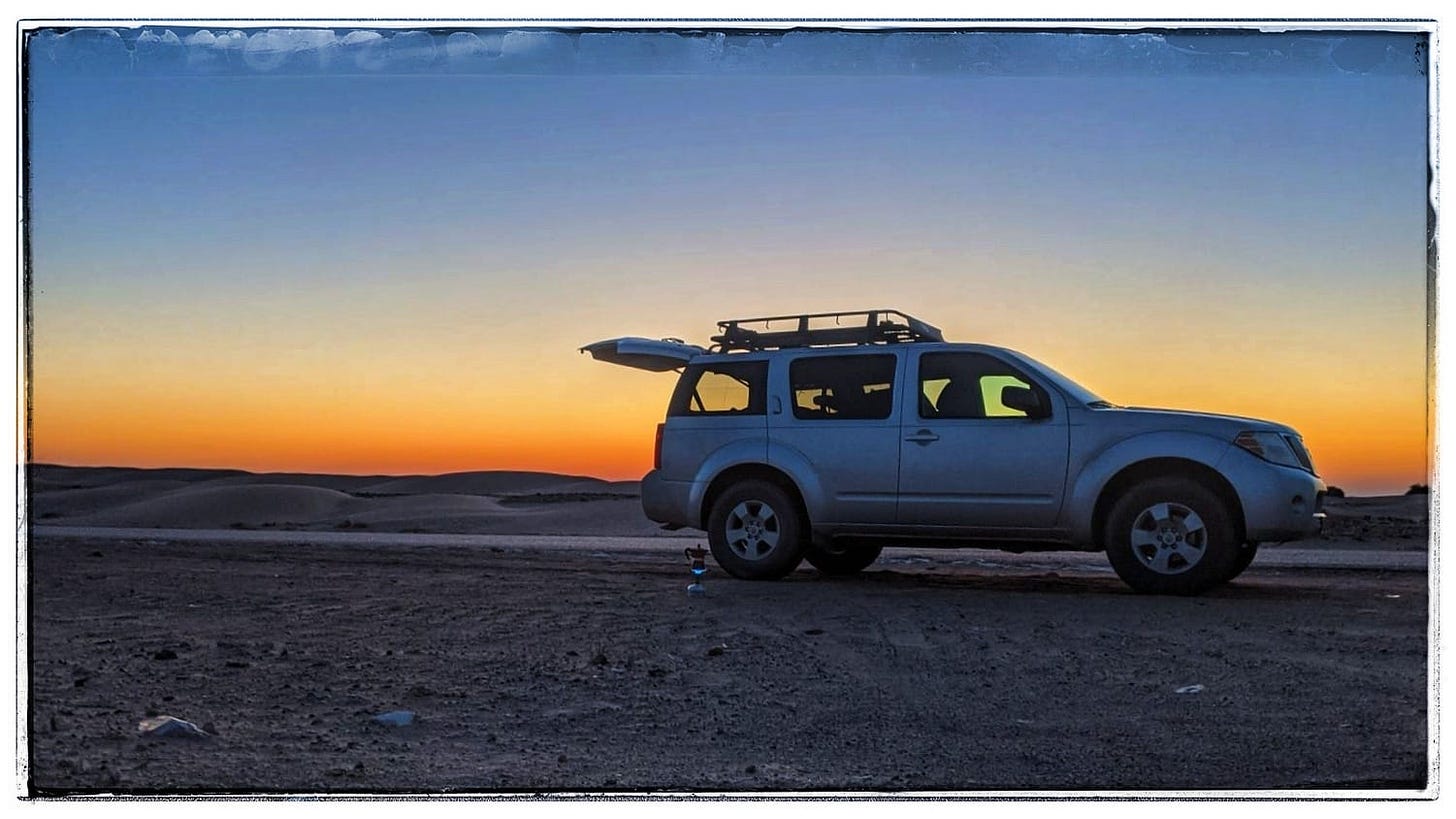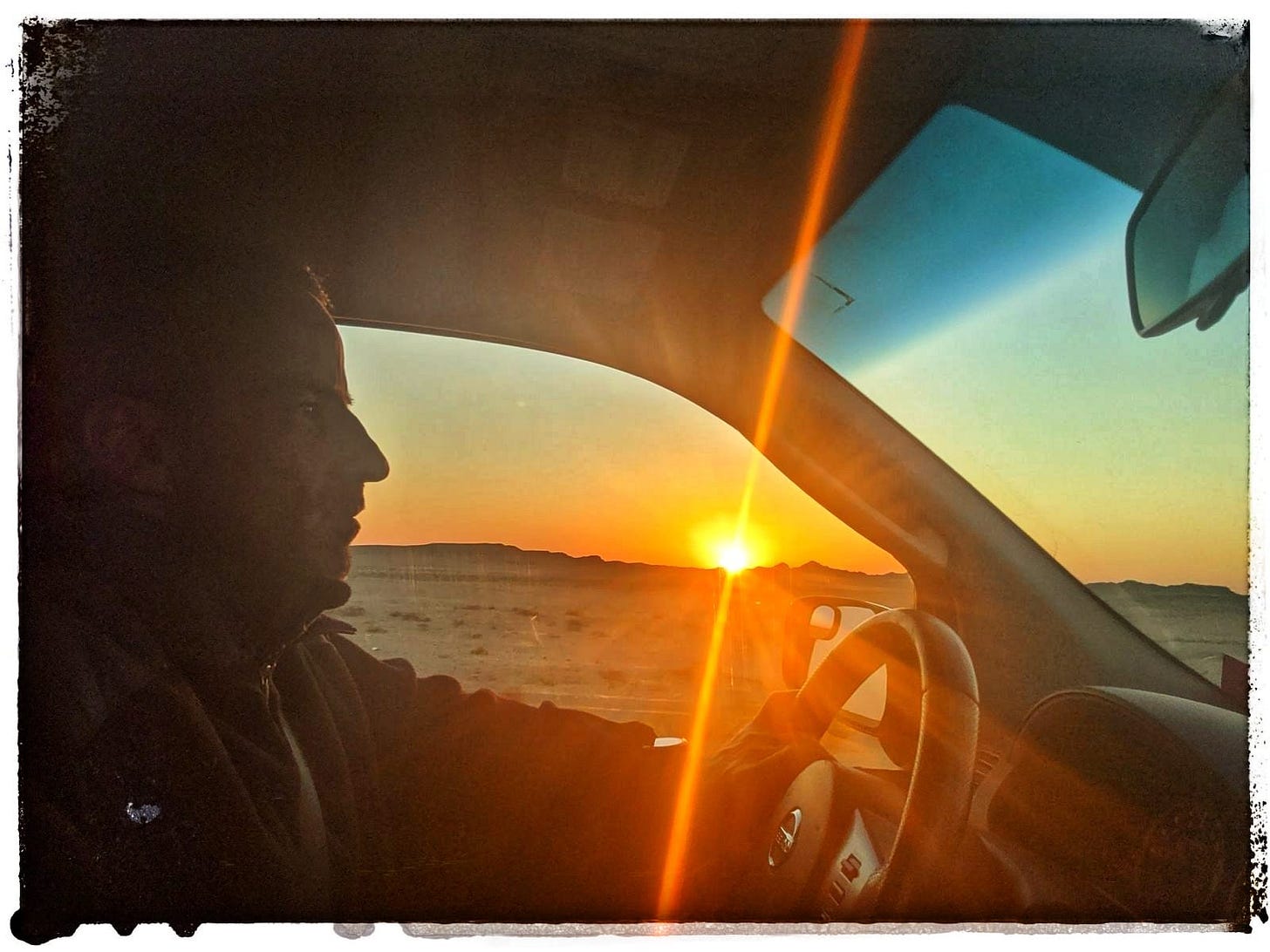He had always spent a lot of time alone. It was something that he had learned out of necessity at a young age, and it became a condition in which he was very comfortable. He became comfortable alone because he had learned how to be alone, not because he loved being alone. There is a difference.
When his 15-year marriage ended, the long-dormant voice of aloneness began again to whisper to him from the shadows. It had been sitting and scheming for all those married years, patiently biding its time, waiting for the right moment to break its silence. When it finally spoke to him, he invited it in and curiously listened to what it had to say. With the hypnotic assurance of the trickster from an old creation myth, the voice tempted him with promises of self-re-discovery and vivid descriptions of a new, inspiring autonomy. He hungered for it.
As he settled into his new life as a half-time parent, he eagerly began filling his time alone with long solo road trips and one-man adventures. He became eager for the times when he could indulge in solitude. He lived in the Sultanate of Oman, a country with seventeen hundred kilometers of stark and primeval coastline, and there was no shortage of places where he could lose himself in emptiness. He reveled in planning trips to remote and untouched corners of the country, places that he had learned about from people who had explored before him. They had made for him hand-drawn sketches of roads and coastlines, decorated with the scribbled names of towns, wadis, and beaches that were partly real and partly fruit of their imagination. He had a collection of tattered gas station maps, marked coarsely with thick marker lines, lines indicating roads and tracks that could lead him to places that belonged to a time before.
He might try to visit the monolithic, leaning shipwreck pounded by the surf at Minji, or maybe spend five days and nights by himself with the thousands of skittering crabs on the long sweep of beach at Ras Madrakah. Perhaps he could camp in the wind shadow of an abandoned fishing boat at Ras Al Markhaz, surrounded by the shifting dunes, the striated white and black cliffs, and the metronomic call of the surf.
He loaded his truck with food, plenty of water, a few clothes, and some fishing gear, and set off.
Omnia mea mecum porto. All that is mine I carry with me.
By late morning, he was winding through the jagged line of mountains that ringed Muscat, mountains seemingly newly born into the landscape, such is the violence with which they reach for the sky. The highway snaked through narrow passes, past small towns nestled in the steep-edged valleys, each settlement a splash of color within the brown mountainscape. A carpet of green date palms filled the valley floor like water fills a lake, and simple, painted homes colored the lake like a flotilla of fishing boats constellates a harbor.
Beyond the mountains lies the edge of the Rub al Khali, the immense desert that covers a third of the Arabian Peninsula. The Bedu have been tracing lines across the Rub al Khali on the backs of their camels since time immemorial, following the life-giving forage and water, telling their stories of this place to their children and to their children’s children. Their rhythm of life remained unchanged for centuries; they crossed and recrossed their paths and the paths of ancestors that came before them. The desert, the unimaginably wide flatness whose edges are manifested only by the thinnest line drawn across the horizon, is the page upon which the history of the Bedu is written.
As he descended from the mountains and into that desert, his mind started to nest comfortably within itself, conversing and debating in different tongues and accents. Reason, words, musings, they all came to him, stayed for a while, turned and evolved, always looking inward, and then quietly slipped away.
The road he followed threaded through small settlements consisting of only a few homes, maybe a dusty store with curious hardware piled outside, and occasionally a small restaurant. Slowing down as he approached such a town, he saw an older man walking alone along the foot-worn track that ran beside the main road. The man was wearing a dishdasha of brown cotton that hung on his thin frame like a windless sail, reaching his sandaled feet. Eddies of dust rose and swirled around him, but he paid no heed to them. The man’s eyes were forced into slits by the bright sun, his copper-colored face deeply creased and framed by a white beard and a clean, white headdress. He was alone, a manifestation of the desert in human form.
The man stood watching as the stranger, cocooned in his vehicle, slowly rolled along the road towards him, moving at a walking pace between speed bumps. With one hand on his hip and the other lifted to shield his eyes from the white afternoon sunlight, the thin man looked at the driver in the same manner that the driver looked at him, both considering the selfsame questions. Questions of existence.
The Omani man lifted his arm and offered a short wave and a smile as the truck pulled alongside him. The driver leaned out his window a little, mirrored both gestures, and then shared a greeting in Arabic. The old man responded in kind. The driver stopped his vehicle and stepped out into the hot air. The men took each other’s hands and traded salutations for a minute or two, as men in a greeting culture are bound to do. They stood in the sun and dust, in communion, asking about one another's lives. Family? Home? Children? Health? Work?
When the ceremony had reached its natural conclusion, the men released each other’s hands and bid one another peace in their futures. The driver climbed back into his truck as the Omani man watched on.
He pulled out of town, and in his rear-view mirror, he saw the Omani man wander off the path and disappear behind the consumed shell of an abandoned pickup truck. And so another infinitesimally small chapter in the story of this place was written.
Continuing to drive south, the towns began to thin out. The road became a black ribbon, as straight as a pin, splitting the world in front of him in two. On either side, the desert rolled out flat, endless, broken only by desperate, gnarled bushes and hostile piles of sharp stones, moved so by forces unknown.
His truck continued to follow the black road towards its vanishing point. At a time spoken to him only by the darkening of the sky and the cooling air, like a moth happening upon a flame, he turned his truck off the smooth blacktop and began to bump along the stony desert floor. He drove west, drawn towards the last vestiges of the day, stopping only when the road was far behind him. He turned the motor off. The very moment after the engine came to rest, he felt a living, roaring silence rush into the space around him. He sat for several minutes, certain that, in the language of silence, the desert was speaking.
The faintest whistling of the wind brought him out of his reverie. He opened the door of the truck and stepped down onto the sand, feeling the warmth on the soles of his bare feet. He stood quietly, looking, feeling the day’s heat reaching up through him. Ahead, the sun, now melting and blood-red, flattened still further onto the horizon. He leaned back against the truck and continued to look out into the emptiness. The cooling evening wind reminded him that this place, this sun, this desert, are all without time.
Moments, measured by a meter unknown to him, slipped by. Finally, the day surrendered its last light. A burning line of fire welded the still-light sky to the darkening sand. The ground under his feet and the last embers of the day were all that was, and in that moment, he felt that he was witnessing creation itself.
He was perfectly alone.
© Marcello Mongardi 2025 | All rights reserved
Fool’s Gold is my Substack publication. To receive new posts and support my work, consider becoming a subscriber.






